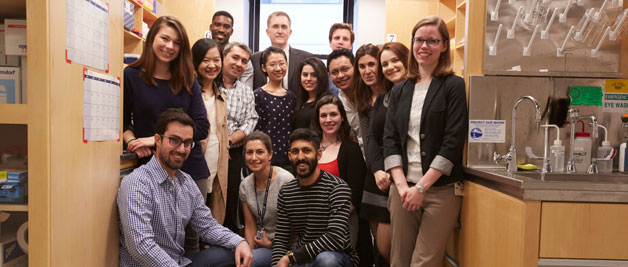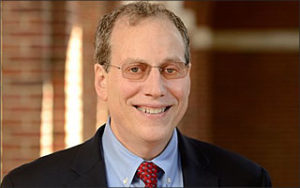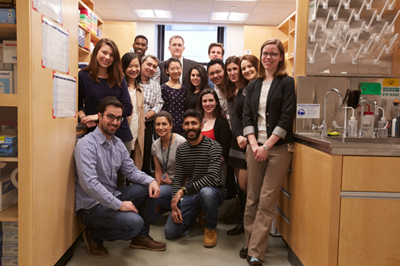
It’s undeniable – the emerging field of epigenetics has ignited the interests of scientists worldwide, fueling discoveries that often raise more questions than they offer answers. New grad students and seasoned PIs alike are delving into the nuances of the molecular epigenetic machinery within us. Even a growing number of specialized labs and institutions are designated solely to epigenetics.
But, who are the people behind the bench, stoking the fire within the lab walls with their fervent dedication to scientific inquiry and discovery? How did these groundbreaking discoveries come about and what do these pioneers in epigenetics envision for the future? Here, we explore a selection of innovative, high-impact labs dedicated to epigenetics and offer an inside look at the people, their major discoveries and hopes for the future.
Epigenetic Research
Novel data have only just begun to peel back the layers of mystery surrounding topics such as disease, aging, and, particularly, cancer. The epigenetics market, merely one indication of the magnitude of the field, is expected to be worth $16.31 billion by the year 2022, according to Grand View Research, Inc. Epigenetics is a term since transformed from its original definition used decades ago, as it continues to refine our understanding of gene regulation and cellular processes.
Notably, in addition to the importance of transcription factors and RNA molecules on whether genes are turned “on” or “off”, epigenetic mechanisms such as DNA methylation and histone modification enfeeble the longstanding belief that our genes are our destiny. Epigenetic research reveals how gene expression can be influenced by external or environmental factors without any impact to the underlying genetic sequence. Some epigenetic marks that attach to DNA may even be passed on for multiple generations, their outcomes echoing throughout family lineages for years. Profound discoveries that arise from epigenetic labs around the world progress us towards a better understanding of complex biological processes and, ultimately, help inform the development of precise therapeutics and preventative strategies.
Feinberg Lab

A major pioneering epigenetic lab belongs to Andrew Feinberg, M.D., M.P.H., the Director of the Center for Epigenetics and head of the Feinberg Laboratory at Johns Hopkins School of Medicine. Feinberg’s early work concentrated on the variation of DNA methylation in cancer and other potential epigenetic variants that could play a role in population-attributable risk of the disease. Years ago, he discovered the molecular basis of Beckwith-Wiedemann syndrome and, in 2001, earned his place on the ISI highly cited authors list.
“My colleagues and I have been interested in the role of epigenetics and human disease for decades,” said Feinberg.
His research focus lies mainly in cancer, but he has also investigated the epigenetic basis of topics such as autoimmune disease, neuropsychiatric illness, and obesity ever since his lab branched into disease epigenetics more generally, about 15 years ago. He has a significant amount of highly cited works, one of which, “The History of Cancer Epigenetics”, was published in Nature Reviews Cancer and has been cited over 1,900 times. Certainly, his research has helped set the groundwork for further exploration into epigenetic mechanisms and disease.
“We now know that most of the mutations in DNA sequence affect the epigenetic machinery of the cell, and we also know that many environmental exposures and even aging itself can affect the epigenome in ways that can increase the risk of cancer and/or the progression of cancer,” Feinberg said.
With this knowledge, we are able to identify biomarkers as well as develop novel epigenetic therapeutics for the treatment of various diseases. As our understanding of cancer and other diseases unfurls, Feinberg also indicates the importance of acknowledging the interplay between genetics and epigenetics, as their interaction together can provide valuable insight.
“I think that purely genetic studies of common disease that ignore epigenetics are limited in their power, but also purely epigenetic studies that ignore genetics are also incomplete. Both are important and they are closely related.”
Among many other projects, Feinberg is currently involved in an ongoing collaborative outer space study of twins Mark and Scott Kelly. Although he awaits the results, he said that “it is still safe to say that this study, of which I am only one of the 10 principal investigators, has brought genetics and epigenetics research front and center in space biology.”
With this study and many others, the Feinberg Lab continues to explore the numerous avenues of disease epigenetics and bring valuable findings to the forefront of the field.
Baccarelli Lab
The Laboratory of Environmental Precision Biosciences, directed by Dr. Andrea Baccarelli at the Columbia University Mailman School of Public Health, is another innovative epigenetic lab that has contributed to the growing field in crucial ways. Baccarelli’s research, which has been conducted in over ten countries and is highly cited, explores the influence of environmental exposures on DNA methylation, histone modifications, and non-coding RNA.

Baccarelli’s lab is very in tune with the world around us. “The popular media depiction of a scientist is someone shut up in a lab all day who is interested only in their experiments and hardly knows what is happening in the outside world, but I think many people know this isn’t the reality.”
His lab, he said, is the exact opposite. “We are intensely aware of the outside world, and work to understand how people’s interaction with the world around them – the environment that surrounds us – affects health and wellbeing.”
It is clear that Baccarelli’s desire to improve public health in light of new research is a considerable driving factor for his work. Like many other researchers, his studies are conducted with the hope of benefiting others.
“I think one of the things I look forward to the most is the opportunity to change the trajectory of people’s lives in a positive way,” said Baccarelli.
And much of his work does just that. One of his studies was so highly regarded that the EPA considered it when lowering the safe level of dioxin emissions. Research like this, driven by its potential application and benefit to public health, contributes to Baccarelli’s overarching goal to close the gap between research and public health.
“Translating findings from basic science to public health remains a substantial challenge, but we are already beginning to see promising outcomes,” he said. “It’s an exciting time to be in this field.”
After starting his career in Italy as an endocrinologist, Baccarelli began his research by examining people who were exposed to a chemical known as dioxin as a result of the infamous 1976 Seveso disaster. However, he ultimately shifted away from studying gene-environment interactions and was drawn towards the field of epigenetics, which he said seemed to have a greater potential for impacting public health.
Baccarelli then became involved in a project studying people of three different occupations – police officers, gas station attendants, and office workers – and their exposure to benzene. There was a clear link between the level of chemical exposure and epigenetic alterations.
“We found an amazing dose-response relationship between benzene exposure and changes in DNA methylation in blood, one of the most studied epigenetic marks. Benzene is known to cause leukemia, for example, so this was one of the first studies to raise the question of whether changes in epigenome-wide methylation can predict disease.”
Since then, they’ve conducted their research through varying scopes, examining both epigenome-wide methylation and methylation of specific genes. At the Harvard T.H. Chan School of Public Health, his group pioneered the developing field of environmental health sciences and examined the epigenetic impact of environmental factors such as pollutants, flame-retardants and endocrine disruptors, and the detrimental health consequences of these toxins.
They continue to expand their repertoire of epigenetic mechanisms of interest and have ventured into other areas of epigenetics, such as “non-coding RNA, which helps regulate how genes are expressed, and histones, which control how DNA folds up and also regulate gene expression.”
They have even begun investigating mitochondria, which are uniquely sensitive to environmental oxidative damage and carry their own DNA. “We recently showed that air pollution and lead increase the blood abundance of mitochondrial DNA molecules, a marker of damaged, dysfunctional mitochondrial DNA, by up to 50%.”
Another study of Baccarelli’s directly applies his research to public health in a way that may help alleviate the obesity epidemic in the United States. By identifying particular epigenetic marks early on in a baby’s development, we could know whether he or she might be prone to obesity later in life. It’s even possible that this susceptibility could be revealed as early as the day the baby is born. Then, appropriate measures can be taken by clinicians to prevent the child from becoming overweight.
“As it stands now, clinicians must wait a few years to see whether a child is on an abnormal weight trajectory. By then, dietary interventions are often ineffective and difficult to maintain.”
The potential for intervention and prevention of detrimental epigenetic consequences seems to be a major impetus for studies like these, especially in the field of environmental health. Part of what makes epigenetics and its connection to disease so fascinating is that various epigenetic marks may potentially be removed or undone. This could mean that changing the epigenetic landscape through novel treatments or lifestyle adjustments may cure or reduce one’s risk of developing disease.
“We know that environmental exposures can affect the epigenome, but we also know that since the epigenome is modifiable, we might be able to counteract damaging exposures and prevent negative effects,” Baccarelli said. “If we understand how environmental exposures affect health, we can then work towards reducing bad exposures and increasing good ones.”
Baccarelli and his group continue to move forward, developing epigenetic projects that aim to bridge the gap between research and public health. His recent move to Columbia’s Mailman School of Public Health allows him to build upon his work on the role of the environment in health and pursue research opportunities for epigenetic prevention and treatment.
Tollefsbol Lab
The Tollefsbol Lab at University of Alabama at Birmingham (UAB) has revealed fascinating epigenetic insights into aging and cancer. Trygve Tollefsbol, Ph.D., D.O., is a professor of Biology and a Senior Scientist at the UAB Comprehensive Cancer Center, the Comprehensive Center for Healthy Aging, the Nutrition Obesity Research Center, and the Comprehensive Diabetes Center. He is also the Director of the Cell Senescence Culture Facility at UAB and the editor of a new book on applied epigenetics called Medical Epigenetics, which focuses on epigenetics diseases, their impact on the human body, and avenues for treatment.

Tollefsbol and his team have published over 40 peer-reviewed articles in the past 5 years. Initially designated solely to epigenetics, his lab has since branched out into nutrition and cancer prevention epigenetics. One of the major epigenetic discoveries attributed to the Tollefsbol Lab involves a topic that fascinates most – anti-aging.
“We discovered in 2010 that glucose restriction leads to extension of the lifespan of human cells and kills precancerous cells and that epigenetics contributes to this process,” he explained. “The importance of our discovery was that it showed that epigenetic mechanisms in response to sugar restriction during cellular senescence played a major role in aging.”
These findings opened up new doors for research into the possibility of extending human life via caloric restriction and the implications this could have for mitigating human aging-associated diseases and cancer.
In addition, many other findings of Tollefsbol’s mark him as a pioneer in this emerging field. He recounted one of his early memorable moments in the realm of epigenetic discovery: “Long ago when the field of epigenetics was still very early on and aging research was not nearly as active as it is now, my wife and I wrote a theoretical paper that we published in 1993 in Medical Hypotheses that proposed mechanisms for de novo methylation that may play a role in aging. By the next year the first experimental data appeared to support this concept.
“It was clear by the early 90s that DNA methylation, for example, plays a role in gene silencing and we also thought that gene silencing was important in aging (few did at the time). So, fusing these two concepts together led to the hypothesis that we published in 1993.”
His lab was involved in epigenetics at the very outset and contributed works that helped launch the field. In 2003, they wrote a theoretical paper proposing molecular mechanisms for epigenetic control of telomerase. His lab has since shifted slightly in its research, now focusing more on epigenetic intervention for anti-aging and cancer prevention and working at an epigenomics level. Of course, epigenetics has always been its anchor point.
The research goals of the Tollefsbol Lab, in part, echo the hopes of many others immersed in the fascinating field of epigenetics: learning about the complex influence of epigenetic mechanisms gone awry in disease and what may be done to prevent it. Specifically, they want to “show how important preventing epigenetic machinery aberrations are to disease prevention and to slow aging.”
Aging has been connected to profound epigenetic changes that lead to alterations in gene expression. Unravelling this process and harnessing its plasticity could, perhaps, one day lead to the extension of lifespan. Not only does the field hold promise for slowing aging, but key information gleaned from results of epigenetic studies can help treat diseases, such as cancer, or may even prevent them altogether.
Tollefsbol is eager for the prospect of epigenetic prevention. “I think that not only epigenetic therapies, but also epigenetic prevention has a great future. We are especially interested in how dietary compounds can prevent epigenetic aberrations to prevent diseases. It would allow us to get ahead of the curve so to speak, and prevent the diseases in the first place before they cause so much human suffering and costs to our health care system.”
“It was lonesome being an epigeneticist in the late 80s and early 90s!” Tollefsbol recalled. Now, the pervasiveness of epigenetics is nearly unavoidable among countless grant directives and research opportunities. “We now know that there are many epigenetic processes and that organisms use these in many different ways. It has been a joy seeing the field grow exponentially since that time!”
Future of Epigenetic Research
Curiosity and determination to improve human life appear to underlie the essence of these and many other epigenetic studies. In light of each publication and engaging discourse, the field continues to carve a niche in the scientific community. Researchers continually navigate fresh evidence and utilize rapidly advancing technology to enhance what we know about disease, at the same time overturning conventional wisdom about our very lives. Certainly, the field of epigenetics has bolstered our understanding of gene expression and rewritten the deeply rooted belief that our genes are our destiny.
Passionate drivers of this field, such as the researchers in the Feinberg, Baccarelli, and Tollefsbol Labs – among many others – work tirelessly to unravel biological mysteries and grasp the subtleties of the epigenetic machinery within us. Many anticipate that the field of epigenetics will continue on its path of expansion, breathing life into new inquiry and scientific discovery and attracting interested minds for quite some time to come.
We would like to thank Dr. Andrew Feinberg, Dr. Trygve Tollefsbol, Dr. Andrea Baccarelli, and their colleagues for taking the time to provide such thoughtful insight into their labs and epigenetic research.


